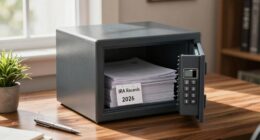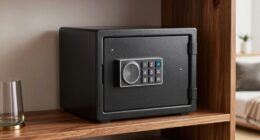With a self-directed IRA, you can invest in approved precious metals like gold, silver, platinum, and palladium that meet strict purity standards. You must work with an IRS-approved custodian and store your metals in a secure, IRS-approved depository—home storage isn’t permitted. All transactions, transfers, and rollovers should follow IRS rules to keep your tax benefits. To make sure you’re on track and stay compliant, continue to explore the key regulations involved.
Key Takeaways
- Only IRS-approved precious metals and coins meeting strict purity standards qualify for IRA investments.
- Use an IRS-approved custodian and depository to manage and securely store your metals.
- Funds can be transferred or rolled over from other retirement accounts, following IRS rules.
- Metals must be stored in approved depositories; home storage disqualifies the IRA.
- Withdrawals are tax-deferred until age 59½, with specific rules for in-kind distributions and early access.

Are you considering diversifying your retirement portfolio with precious metals? If so, understanding the rules for Self-Directed IRAs is essential to ensure your investment complies with IRS regulations. First, only certain precious metals qualify for inclusion in an IRA. These metals must meet strict purity standards: gold must be at least 99.5% pure, silver 99.9%, platinum and palladium 99.95%. Not every coin or bar is eligible; for example, American Gold Eagles, Canadian Maple Leafs, and similar IRS-approved coins are acceptable, while jewelry or numismatic coins are not. This means you need to verify the purity and eligibility of your metals before purchasing.
To set up a Self-Directed IRA, you’ll need to choose a custodian approved by the IRS. The custodian manages your account and ensures the investments stay compliant. They handle the paperwork, record-keeping, and transactions, which helps prevent costly errors. You’ll also need to partner with an IRS-approved depository to store your metals securely—these facilities have strict security measures and often offer insurance options. Remember, you cannot store your metals at home; doing so violates IRS rules and disqualifies your IRA. The IRS mandates that all physical metals be stored in approved depositories, emphasizing the importance of secure and compliant storage solutions. Additionally, you should be aware that eligible metals must be stored in a manner that maintains their purity and quality, which is why proper storage is crucial.
Funding your IRA involves transferring or rolling over funds from an existing retirement account or making new contributions, depending on your situation. Once the account is funded, you can instruct your custodian to purchase eligible metals on your behalf. The entire process must adhere to IRS rules to maintain the tax-advantaged status of your IRA.
Tax benefits are a key reason to invest in precious metals through an IRA. Gains grow tax-deferred until you withdraw the funds, typically after age 59½. Early withdrawals may incur penalties and taxes unless you qualify for exceptions. Roth IRAs offer the advantage of tax-free withdrawals, provided certain conditions are met. However, any in-kind distribution—taking physical metals out of the IRA—can trigger a taxable event, so it’s important to understand the implications.
The IRS also regulates storage and security. Metals must be stored in approved depositories, which conduct regular audits to ensure compliance. You’re not permitted to store metals at home or in personal safes; doing so disqualifies the IRA and could lead to penalties. Fees associated with custodians and depositories tend to be higher because they involve secure storage and compliance costs.
Frequently Asked Questions
Can I Use My Self-Directed IRA to Invest in Cryptocurrencies?
Yes, you can use your self-directed IRA to invest in cryptocurrencies. It allows you to diversify your retirement portfolio beyond traditional assets like stocks and bonds. You’ll need to work with a custodian experienced in crypto investments, make sure the assets meet IRS guidelines, and avoid prohibited transactions. Keep in mind, all transactions must be conducted through the IRA to maintain tax advantages and compliance.
Are There Age Restrictions for Opening a Self-Directed IRA?
Did you know that over 30 million Americans have some form of IRA? You can open a self-directed IRA at any age as long as you’re earning income or have earned income in the past. There are no upper age limits, but if you’re under 59½, you might face early withdrawal penalties. As long as you meet income requirements, age won’t stop you from investing in precious metals or other assets.
How Often Can I Make Contributions to My Self-Directed IRA?
You can make contributions to your self-directed IRA up to the annual limit set by the IRS, which is typically adjusted for inflation each year. You can contribute once or multiple times throughout the year, as long as the total doesn’t exceed that limit. Keep in mind, you must do so before the tax-filing deadline, usually April 15 of the following year, to maximize your contributions and tax benefits.
What Are the Penalties for Prohibited Transactions?
Prohibited transactions in your self-directed IRA are like crossing a red line—if you do, you face serious penalties. You could owe taxes, face early withdrawal penalties, or even lose your tax-advantaged status entirely. The IRS sees these violations as illegal, so it’s essential to stay within the rules. Keep clear boundaries, or you risk costly consequences that could jeopardize your retirement savings.
Can I Rollover Funds From a Roth IRA Into a Self-Directed IRA?
Yes, you can rollover funds from a Roth IRA into a self-directed IRA, but you need to follow specific rules. You must initiate a trustee-to-trustee transfer to avoid taxes or penalties. Make certain the rollover is completed within 60 days. Also, confirm that your self-directed IRA custodian allows Roth conversions and follow all IRS guidelines to maintain your tax-advantaged status. Consulting a financial advisor is highly recommended.
Conclusion
Now that you understand the rules for your self-directed IRA and precious metal investments, you’re armed to make smarter choices. Remember, this is your future, and the right decisions can secure it. Are you ready to take control and build the wealth you deserve? With knowledge and caution, you can navigate these rules confidently and turn your investment goals into reality. The question is, are you prepared to make that leap today?









